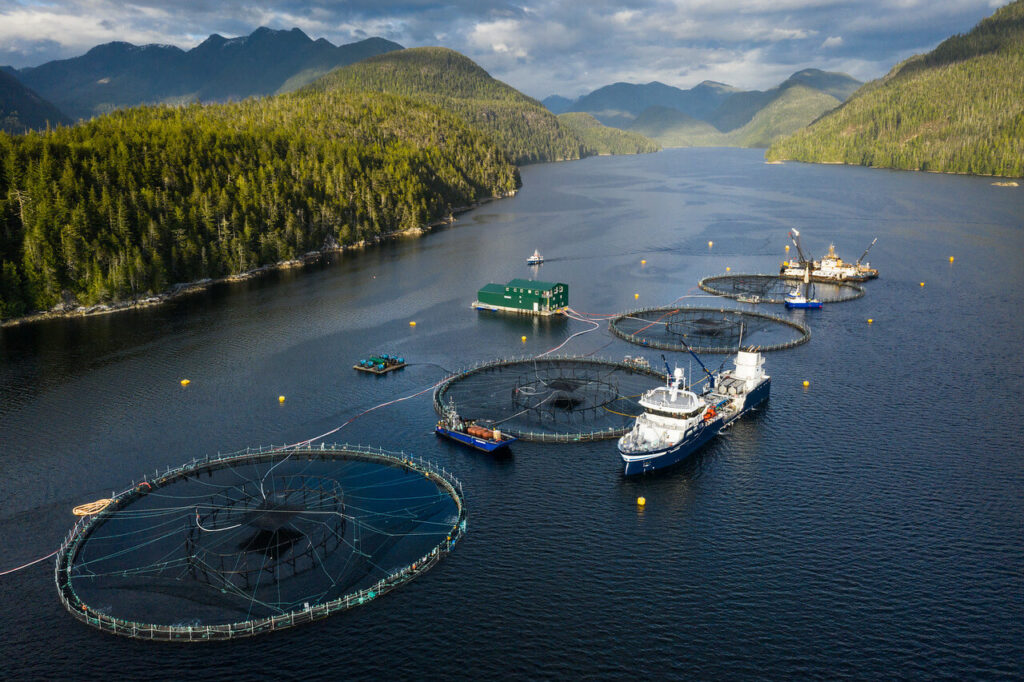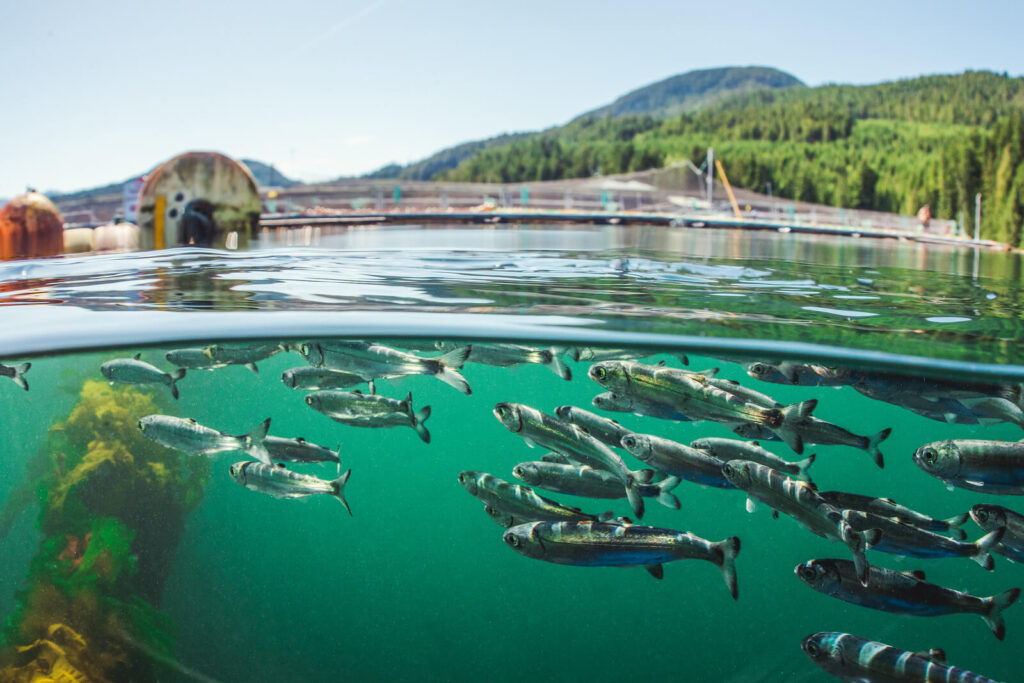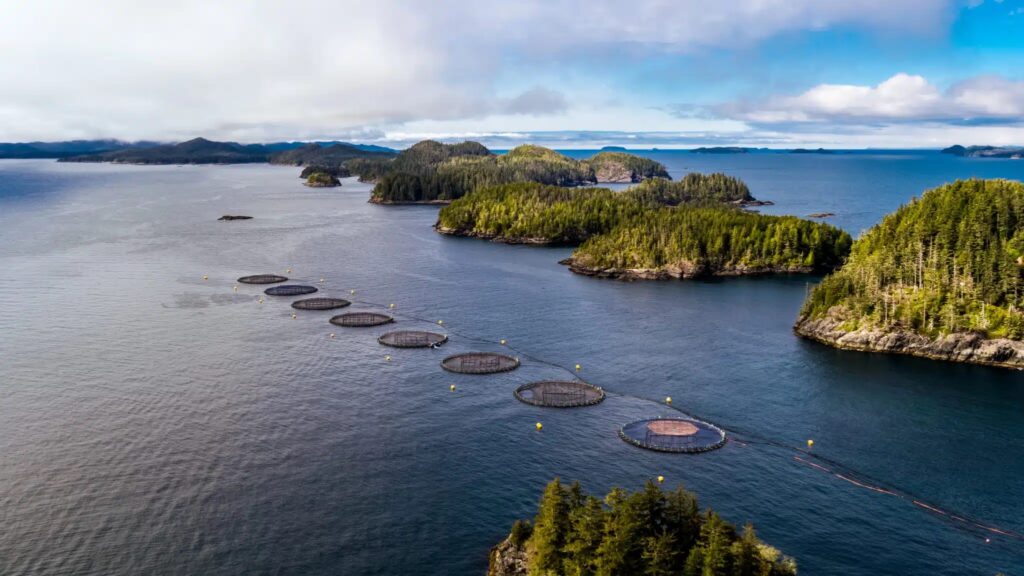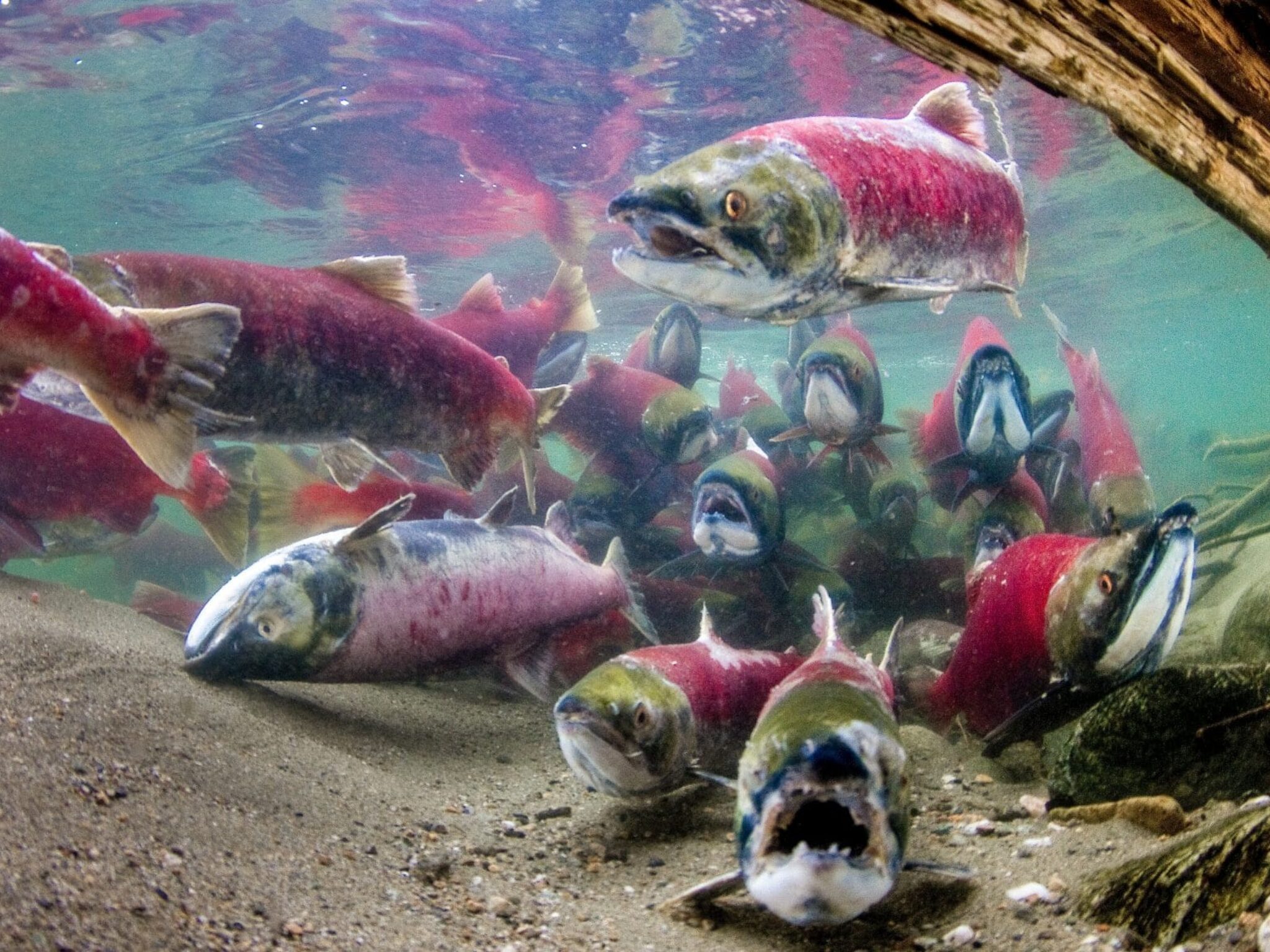Canada Confirms Ban on Open-Net Pen Salmon Farming in British Columbia, But Pushes It Back to 2029
6 Mins Read
The Canadian government has announced it will ban open-net salmon farms in British Columbia in 2029, but environmentalists have criticised the five-year-long delay in implementation.
By 2029, open-net salmon farming will be banned in British Columbia, the Canadian government has announced. But while some environmental activists hailed the move, others are questioning the slow pace of the move, given it represents a delay from the original phaseout deadline of 2025.
“Today, we are saying enough,” said natural resources minister Jonathan Wilkinson. It’s time for us to actually ensure that we are protecting the environment and thinking about how we actually move forward from the economic perspective.”
A transition from open-net pen farming to closed containment technologies was first announced by the administration in 2019, with the aim of protecting declining wild Pacific salmon populations. “We are delivering on that promise and taking an important step in Canada’s path towards salmon and environmental conservation, sustainable aquaculture production, and clean technology,” said Wilkinson.
But to facilitate this transition, fisheries minister Diane Lebouthillier has renewed the licences of aquaculture farms for another five years, though from next month, these will come under stricter conditions to ensure improved management of sea lice on farmed fish, robust reporting requirements, and monitoring of marine mammal interactions.
She argued that the licence extinction would allow farms to transition in a “responsible, realistic, and achievable” manner and ensure “the protection of wild species, food security and the vital economic development of British Columbia’s First Nations, coastal communities and others”, as the government works on a final transition plan by next year.
Why Canada is banning open-net pen salmon farming

There are dozens of aquaculture farms in British Columbia, but more than half of the over 9,000 wild salmon populations in its waters are dwindling. The province’s farming industry has previously been caught dumping piscine orthoreovirus-infected (a fish virus) blood into Canada’s largest wild salmon migration route, and scientists had warned in 2012 that a virus was infecting both its farmed and wild salmon, which is a detriment to human health too.
At the time, the Canadian government ignored these warnings, stating that risks to salmon populations were low. But in 2019, it finally announced its intention to ban open-net farming, which involves farming hundreds of thousands of salmon in large cages or pens.
These farms are located along coastal areas to take advantage of ocean currents by delivering oxygen to fish and dispersing their waste, which flows into the water and releases deadly parasites, pollutants and pathogens. This can change the chemical composition and biological diversity of the seabed around the pens, and lead to disease outbreaks via the spread of sea lice parasites.
Many have proposed closed-containment farming as an alternative, which comprises a range of technologies – from floating bag systems to land-based recirculating water systems – that aim to restrict interaction between farmed and wild salmon, preventing the transfer of diseases, waste and sea lice.
Under the new regulations, only marine or land-based closed-containment systems will be considered for salmon aquaculture licenses in coastal British Columbia. Since this involves greater investment costs, the government intends to issue nine-year licences for successful closed-containment applicants.
Protecting First Nations and coastal communities

The ban has spawned reactions spanning from laudatory to critical. The BC Salmon Farmers Association suggested the move could cost up to 6,000 jobs and hinders an industry that generates C$1.2B ($880M) for the province.
“The idea that 70,000 tonnes of BC salmon can be produced on land in five years is unrealistic and ignores the current capabilities of modern salmon farming technology, as it has not been done successfully to scale anywhere in the world,” said Brian Kingzet, executive director of the association.
A major spotlight is on First Nations populations and coastal communities, who rely on open net-pen aquaculture for their livelihood. “We recognise the importance of meaningful and thoughtful engagement with First Nations partners and communities as we move forward, in order to ensure that economic impacts are mitigated and we incentivise and promote wild fish health, reconciliation, economic development, and food security as we move forwards,” said Wilkinson.
The government will release a draft transition plan by the end of July, which will focus on supporting Indigenous and coastal communities, identifying economic opportunities for “clean aquaculture technology”, setting criteria and milestones for the transition to closed-containment farms, and managing open-net pen salmon farming until the ban comes into effect by the end of June 2029.
“Wild Pacific salmon is part of who we are as British Columbians. This measure respects the Wild Salmon Policy, the precautionary principle, and is part of our commitment to environmental stewardship and reconciliation,” said citizens’ services minister Terry Beech.
“We will work with Indigenous communities, industry, governments, and stakeholders to restore the abundance of wild salmon for the benefit of future generations while growing the sustainable aquaculture industry as part of our Blue Economy Strategy,” he added.
Bob Chamberlin, chairman of the First Nation Wild Salmon Alliance, applauded the move, stating “This date will serve the longer-term needs of protecting wild Pacific salmon from the impacts of the open-net pen fish farm industry, and is a positive step in that regard.”
Five-year timeline raises eyebrows

Some have raised concerns about the delay. “We are relieved that the federal government is sticking to their commitment to remove the farms, but five years is too long for the phaseout period,” said Aaron Hill, executive director of the Watershed Watch Salmon Society. “That’s five more years of bombarding wild salmon with parasites and viruses from factory fish farms.”
Michael Meneer, president and CEO of the Pacific Salmon Foundation, echoed this sentiment. “Given the challenged state of many Pacific salmon species, we would have preferred a shorter timeline than the five-year license renewals announced today,” he said.
However, Meneer recognised the impact on First Nations and dependent communities: “We must acknowledge the need for a thoughtful and well-supported transition for First Nations and coastal communities impacted by this decision. The risks to salmon are clear, but we know this decision is complex and that resilient communities are just as important as resilient salmon.”
Stan Proboszcz, senior science and policy analyst for the Watershed Watch Salmon Society, stated that the government could change next year, which is why it was important “to see the development of the regulatory framework that enshrines the ban into law as soon as possible”.
Salmon farming has been under the environmental microscope for years now. To tackle the growing demand and declining populations, as well as mitigate the climate impact, developing novel alternatives is essential. The Canadian government has recognised that, with its innovation cluster Protein Industries Canada making multimillion-dollar investments into alternative proteins.
In November, it contributed $4.5M to an $11.4M project involving plant-based seafood company New School Foods, precision fermentation startup Liven Proteins, and dehydration solutions provider NuWave Research (all Canadian), with the goal of commercialising a whole-cut vegan wild salmon analogue that “transforms from raw to cooked” and replicates the taste and texture of its conventional counterpart.



